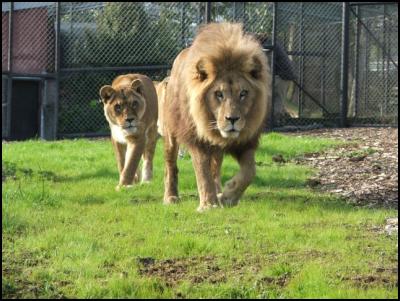Not your ordinary day job for veterinarian
NZVA MEDIA RELEASE
24 April 2008
Not your
ordinary day job for veterinarian

The New Zealand
Veterinary Association (NZVA) says World Veterinary Day,
Saturday 26 April, is a great opportunity to highlight the
important wildlife work many of its members are involved in,
like Franklin Zoo director Helen Schofield.
Waking at dawn to feed monkeys and check on lions is not a typical start to the average veterinarian's day, says Helen, but the rewards are just as great.
As a veterinarian, Helen says there is a mountain of opportunities and different areas of practice available these days.
"For anyone with an interest in animal health and welfare with a difference, a career working with wildlife and exotic animals at zoos or sanctuaries can be incredibly worthwhile."
Helen, who purchased the zoo with her husband and other shareholders in 2005, says even when she worked in regular practice she often dealt with exotic animals such as camels, turtles, birds, snakes and emus.
She also works as a technical veterinarian, giving nutritional and marketing advice to a pet nutrition company, and has worked for both Wellington and Perth zoos during her career.
Helen says although the same principles apply to treating exotic and domesticated animals, the practical applications and examinations couldn't be more different.
"In a typical veterinary practice I would be hands on with the animals while examining them or taking their temperatures, but with exotic animals we spend a lot of time simply observing behaviour and animal posture.
"To touch a lion without anaesthesia would be dangerous, and even with the more accepting animals such as monkeys, if we take one out of the enclosure to examine its condition we risk alienating it from the rest of the troop when it returns."
But there's more to zoo keeping than taking care of exotic animals. Helen says one of the most satisfying aspects of working at the zoo is education and the junior zoo-keeping programme for children aged 8 to 17.
"The children learn all about the classification of animals, ethics, welfare and behaviour enrichment - how to create environments to provide animals with social groups, places to hide, and a natural environment with things to do in their day.
"We also explore conservation issues with the junior zoo keepers and investigate the veterinary industry and other career avenues for kids who love animals."
The zoo is also a strong supporter of the Kea Conservation Trust - set up to protect the kea, an endangered New Zealand native mountain parrot; and Bird Wing - a division of the SPCA that looks after injured birds.
"We give talks to the public every day which include why the numbers of kea are dropping and what the public can do to help.
"We also introduce the lions and other animals to our visitors; explain a little about the individuals and what is happening to the environment they originate from, and what can be done about it."
Helen says living and working at the zoo is a serious commitment, but a great way to put her veterinary skills to a worthwhile cause.
"We have big dreams about what our zoo can do. In the future we want to use it as a base to help organisations and animal sanctuaries around the world. We encourage our staff to proactively work on conservation by pursing projects here and overseas while they remain employed with us."
Franklin Zoo keeper, James, is currently helping locals in Borneo to build a sanctuary for the sun bear, and another keeper, Graeme, is helping zoos set up social groups of chimpanzees in Australia.
World Veterinary Day is on Saturday 26 April 2008 and is in recognition of all the work vets do, not just in traditional areas of animal health and welfare, but also in other areas such as wildlife management and research, pharmaceutical research and development, biosecurity, food hygiene, conservation, and education.
ENDS


 Primeproperty Group: Primeproperty Group Purchases The Reading Cinema Complex & Adjoining Car Parking Properties in the heart of Wellington's Courtenay Place
Primeproperty Group: Primeproperty Group Purchases The Reading Cinema Complex & Adjoining Car Parking Properties in the heart of Wellington's Courtenay Place Hugh Grant: Lessons From Australia - How Digital Tools Could Support NZ Nurses In Palliative Care
Hugh Grant: Lessons From Australia - How Digital Tools Could Support NZ Nurses In Palliative Care Canterbury Museum: Dinosaur Dolphins Survived In New Zealand Long After Extinction Elsewhere
Canterbury Museum: Dinosaur Dolphins Survived In New Zealand Long After Extinction Elsewhere Retail NZ: Retailers Still Under Pressure At End Of 2024
Retail NZ: Retailers Still Under Pressure At End Of 2024  University of Canterbury: Research Sheds Light On Fire Risk For Canterbury
University of Canterbury: Research Sheds Light On Fire Risk For Canterbury GE Free NZ: Potential $20 Billion Loss In Export Demand Threatens Rural Communities
GE Free NZ: Potential $20 Billion Loss In Export Demand Threatens Rural Communities



